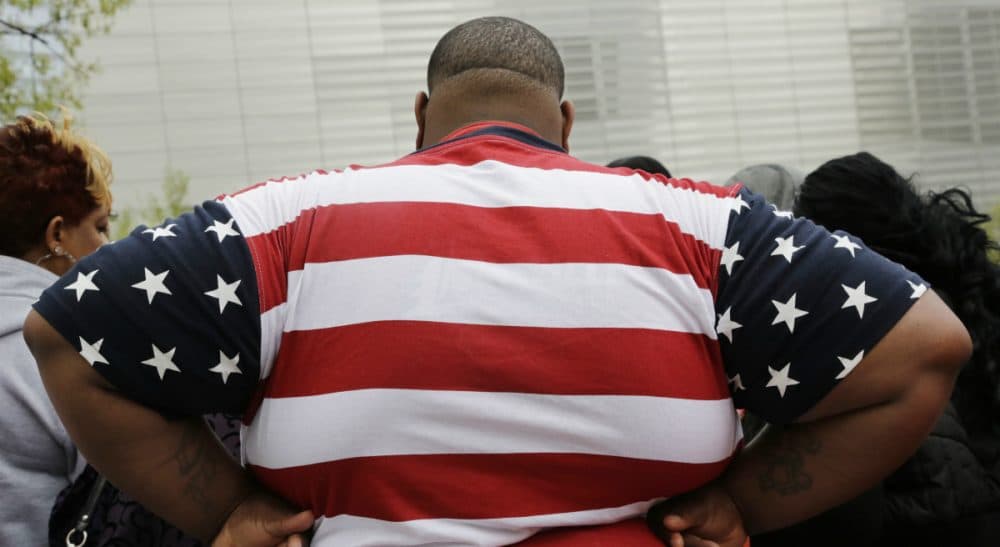Advertisement
Who'll Be The Biggest Loser? Big Agriculture Versus America's Obesity Epidemic

Gym memberships have soared in recent decades, but even so, the ranks of the overweight and obese continue to rise without breaking a sweat. So it’s past time for us to deploy what could be the best weight control plan: reforming agriculture policy.
Seriously.
...when it comes to managing weight, it’s diet, not those gym memberships, that controls the master switch.
Don’t misconstrue me: Exercise is a life-lengthening essential, and sweating can keep some pounds off. But a hefty body (sorry) of research suggests that, when it comes to managing weight, it’s diet, not those gym memberships, that controls the master switch. And our national farm policy promotes unhealthy diets. A recent study of contestants on NBC’s "The Biggest Loser," a reality program about obese people competing to lose weight, suggests that a government that encourages healthy eating is vital, particularly for the obese.
The research about the limited payoff of that gym membership is startlingly diverse. One study of Tanzanian hunter-gatherers — by necessity more physically active than we desk-bound denizens of the Information Age — found they burned no more calories on average than Americans and Europeans. The study admittedly involved only a few subjects. But a review of exercise studies done 15 years ago found similarly underwhelming weight loss from workouts. A 2006 review concluded that exercise works best at shedding weight when it’s combined with diet. Other studies, involving people of varying ages, genders and fitness, also vouch for watching what and how much you eat.
Meanwhile, a paper published last year by Harvard researchers reported that the healthiness of Americans’ eating improved in the 13 years ending in 2012 — but not among the poor and less educated. Even with the improvements, the researchers concluded that “overall dietary quality in the United States remains poor.” Fixing that is a crucial part of any healthcare or anti-inequality policy worthy of the name.
Which brings us to ag reform: Perversely, our government pays for bad diets. Farm subsidies go to crops involved in producing processed food and meats, which Americans consume to excess, rather than fruits and vegetables. In a rational world, we would phase out those subsidies, cap crop insurance payments (which cost a bundle), and redirect some of these savings to support fruit and vegetable farms and farmers markets, especially in poor neighborhoods. These changes would blunt other noxious effects of our food policy, which wastes money subsidizing corporate agribusiness and contributes to pollution and inhumane treatment of factory-farmed animals.
These reforms are all the more necessary when you consider the recent analysis of contestants from "The Biggest Loser." A study showed that, as expected, the contestants’ metabolisms slowed once they had taken off all their weight. What stunned researchers was what happened six years after the show. As The New York Times reported, “The contestants’ metabolisms did not recover. They became even slower, and the pounds kept piling on. It was as if their bodies were intensifying their effort to pull the contestants back to their original weight.”
Advertisement
Until we adopt a sensible plan... the American taxpayer, dunned by a rapacious and unhealthy food production system, will be The Biggest Loser.
True, the subjects clung to an appreciable amount of their weight loss, avoided diabetes, and were healthier than they’d been. Arguably, the metabolism findings make it all the more urgent for government to support healthy food farms: If the obese must battle their bodies’ urge to gain back weight, better for taxpayers to subsidize health food to sate that hunger rather than junk. (Of course, whether dieters would choose that healthy food is another matter.)
Meanwhile, for the non-obese overweight, studies emphasizing the importance of diet jive with my own experience, for what it’s worth. I’ve been fairly diligent about exercising over the years, but it wasn’t until I improved my eating habits that I got down to the weight my doctor recommended. Last year, the British Journal of Sport Medicine declared it “time to bust the myth of physical inactivity and obesity: you cannot outrun a bad diet.”
Until we adopt a sensible plan to put not only overweight Americans on a diet, but corporate welfare recipients, polluters and animal torturers as well, the American taxpayer, dunned by a rapacious and unhealthy food production system, will be The Biggest Loser.
